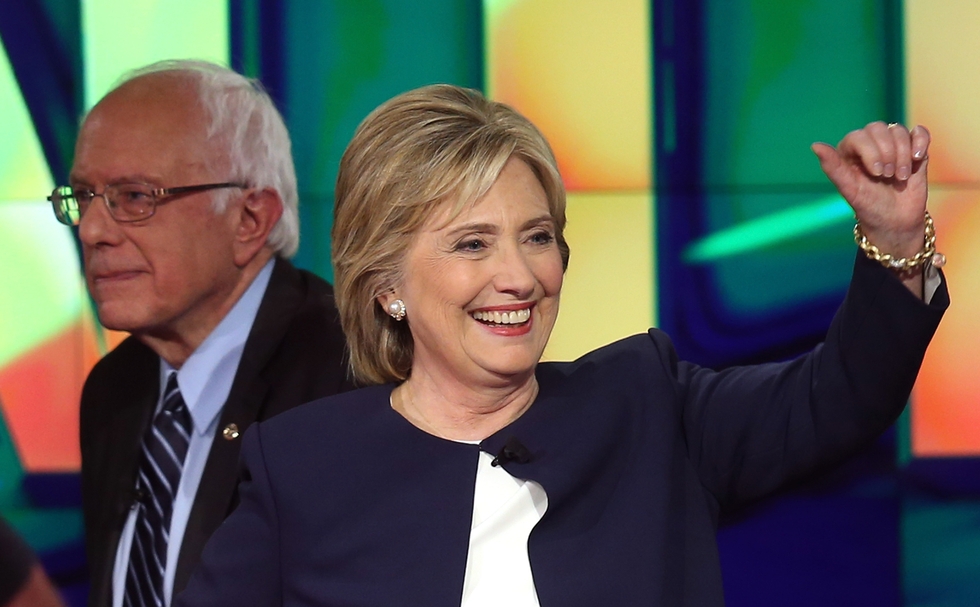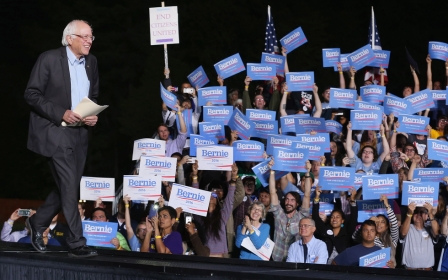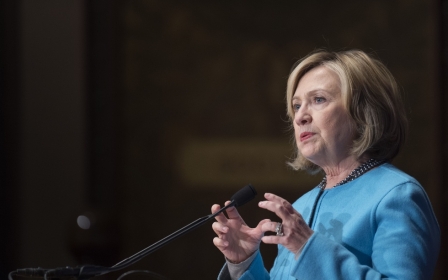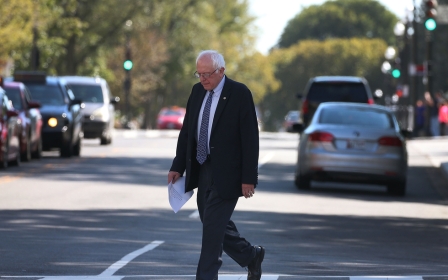Israel: The great unmentionable in the Democratic debate

Iraq. Libya. Syria. Iran. ISIS. Russia’s recent intervention against ISIS in Syria. The “Arab Spring”. What the US could have and should have done differently. There was certainly enough discussion of the turmoil in the Middle East during the US democratic presidential debates on Tuesday night.
Yet even as lynch mobs were roaming the streets of Palestine, chanting “Death to Arabs,” while tens of thousands of Palestinians were joining demonstrations protesting Israel’s intensifying ethnic cleansing of the Palestinian people, Israel was barely mentioned at all, and there was no reference from any of the would-be presidents about the “strategic value” of “our greatest ally.”
Anderson Cooper, the moderator, did not ask a single question about what is now being described as the Third Intifada, and the contenders, who successfully interjected topics they wanted to discuss, veered clear of the subject.
There is no way the politicians were unaware of the fierce clashes in Israel and Palestine. Since 1 October, seven Israelis and 31 Palestinians have been killed, and over 1,000 Palestinians have been injured, many of whom have sustained life-long injuries. One Israeli was stabbed by a fellow Israeli, who had mistaken him for a Palestinian.
Only last week, Sanders had to put out some fires on his own campaign trail, when a member of his campaign staff threatened Palestine activists with arrest for holding up a sign during one of his speeches, asking “Do you #FeelTheBern for Palestine.” Sanders apologised to the activists, explaining that the staff member would no longer be empowered to do so at future events.
Yet just as he had earlier evaded the opportunity to make a genuine statement of solidarity with an oppressed community, when he declined to speak after a #BlackLivesMatter disruption, Sanders also failed to make a statement about Israel and Palestine at this protest.
Sanders’ position on Israel/Palestine is that “Israel has a right to exist in peace and security. And the Palestinians are entitled to a state of their own with full political and economic power.” As such, his position mirrors that of the current administration, and offers no way out of the impasse.
One can presume, from the fact that he supported Israel's assault on Gaza in the summer of 2014, and has never voted against military aid to that country, that he is unlikely to hold Israel accountable for any of its crimes. It makes sense, therefore, for him not to bring up the subject. If he did, he would be revealing a critical weakness: his lack of vision, at a time when his constituency is clamouring for a way out of the “peace process as usual”.
On the other hand, two days before the debate, Hilary Clinton had expressed concern over the violence in Palestine, predictably focusing exclusively on Israeli deaths. “I am alarmed by the recent wave of attacks against Israelis, including more than a dozen separate attacks since last Saturday,” Clinton had said. “My thoughts and prayers are with the victims and their families. Men and women living in Jerusalem, Tel Aviv, and elsewhere cannot carry groceries or travel to prayer without looking over their shoulder. It is wrong, and it must stop. There's no place for violence - only dialogue can produce a lasting peace.”
Clinton did not, however, mention any of this during the debate. She clearly was trying to project her image as someone who has evolved, and is now more progressive that she has been so far. If anything, her dogged refusal to acknowledge Israel’s violence is one of the few things she has not budged on. But the fact is, open support of Israel today is no longer viewed as a “progressive” position.
In an unduly alarmist op-ed in the Israeli newspaper Haaretz, Seth Lipsky described the silence around Israel as “a remarkable moment for the Democrats.” He went so far as to suggest that this “benign neglect” could slide “from benign neglect, to neglect, to indifference, to hostility”.
Lipsky’s fears seem way overblown. After all, both probable winners of the Democratic nomination are avowed Zionists, unlikely to ever foster hostility towards Israel. Sanders may not depend on campaign funding from the likes of Israeli-American donor Haim Saban, but his record, going back to the 90s, reveals that even though he is occasionally aware of Israel’s “disproportionate violence,” he remains committed to the security of the occupier over that of the oppressed occupied civilian population. And Clinton had only the night before made her offensive statement, affirming to all who care to hear that, as far as she is concerned, Palestinian lives do not matter one tiny bit.
But for a growing majority of Democratic-leaning voters, Palestinian lives are beginning to matter. Israel’s oppression of the Palestinian people is mirroring their own disenfranchisement in their own country, their own discomfort, their fear of their own over-militarised racist police force. For these would-be voters, the peace process is finally revealed for what it is, a farce that is preserving an unacceptable status quo. And the naivete that propelled Obama to the presidency seven years ago is wearing out. Today’s voters want more than evasive statements, if even that, from their politicians.
Who won last night’s debate, Bernie or Hillary? Most media in the US say Clinton was the winner. Yet while she depends heavily on AIPAC funding and support, Clinton is seeking the vote of the younger Democratic base that is alienated from the likes of Sheldon Adelson and Haim Saban.
Sanders, on the other hand, is the candidate who is not only perceived as more progressive, but who actually is striving to be more progressive. And Sanders understands that “progressive” today means pro-Palestine, amongst just about any progressive constituency, and certainly amongst young Democrat-leaning voters.
Of course, this is but one round. But in this first round, which may set the tone for future ones, one thing is for sure: the candidates are no longer pandering shamelessly to Zionists, and defending Israeli actions at all costs. As such, Israel, which none of the candidates felt the need to openly pledge allegiance to, is currently the loser. It is now up to the progressive base among Democrats to keep the pressure of their candidates, to clamour loud and clear that as far as Israel is concerned, immunity is no longer an option.
- Nada Elia is a Diaspora Palestinian writer and political commentator, currently working on her second book, Who You Callin' "Demographic Threat?" Notes from the Global Intifada. A professor of Gender and Global Studies (retired), and is a member of the Steering Collective of the US Campaign for the Academic and Cultural Boycott of Israel (USACBI)
The views expressed in this article belong to the author and do not necessarily reflect the editorial policy of Middle East Eye.
Democratic presidential candidates Sen. Bernie Sanders and Hillary Clinton walk on the stage at the end of a presidential debate sponsored by CNN and Facebook at Wynn Las Vegas on October 13, 2015 in Las Vegas, Nevada. (AFP)
New MEE newsletter: Jerusalem Dispatch
Sign up to get the latest insights and analysis on Israel-Palestine, alongside Turkey Unpacked and other MEE newsletters
Middle East Eye delivers independent and unrivalled coverage and analysis of the Middle East, North Africa and beyond. To learn more about republishing this content and the associated fees, please fill out this form. More about MEE can be found here.





